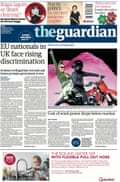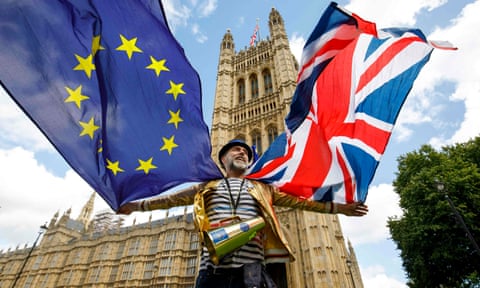Top story: May facing laundry list of leave bill amendments
Hello – it’s Warren Murray bringing you today’s briefing.
Theresa May has faced immediate calls to rewrite her Brexit bill after it was backed by a majority of 326 to 290 in the House of Commons in the very early hours of this morning. Seven Labour MPs defied the party whip to help send the bill to a second reading. The prime minister called it a “historic decision to back the will of the British people” and said the vote would give clarity and certainty through the Brexit process.
But a long queue immediately formed to table amendments. The former attorney general Dominic Grieve is among chief Tory critics of the bill, and was joined in signing amendments by John Penrose from the pro-leave European Research Group. Like numerous other MPs, the pair is opposed to the bill’s sweeping use of “Henry VIII powers” allowing ministers to bypass parliament. “If Brexit is supposed to take back control of our laws,” argued Penrose, “it’s pretty hard to argue that the small number of genuinely important and substantive changes should simply be waved through parliament without thorough debate.”
The shadow Brexit secretary, Keir Starmer, said Labour would seek to remove the worst aspects of the bill but called its flaws “so fundamental” that it was hard to see it ever being made “fit for purpose”. Among Labour MPs not voting with the party line was Caroline Flint from the strongly pro-leave Don Valley constituency, who abstained. She said the bill’s scope of powers would need attention but it was not Labour’s job to kill it – “these issues can all be resolved”.
‘Global and existential threat’ – The UN security council has voted unanimously for new sanctions against North Korea, banning its textile exports and putting a ceiling on supplies of crude oil. The American mission to the UN said the resolution would cut off about 30% of North Korea’s oil supply and ban over 90% of its publicly reported 2016 exports. Observers said the sanctions were unlikely to bear fruit without negotiations. Russia’s UN ambassador, Vassily Nebenzia, repeated Moscow and Beijing’s call for the US and South Korea to suspend military exercises if Kim Jong-un’s regime agrees to put its nuclear and missile programmes on hold and take part in talks.
Irma’s fury – Hurricane Irma has slowed to a tropical depression after battering northern Florida. Our live coverage is continuing. The US death toll stands at 10 across Florida, Georgia and South Carolina. People remain trapped on the islands of the Florida Keys where there has been heavy damage. At least 36 people were killed around the Caribbean when Irma tore through Barbuda, the Virgin Islands, Puerto Rico, French St Martin, the Bahamas, Cuba and other islands. The US, France and Britain are among countries sending aid and personnel to the region.
Wind change – Nuclear plants have been overtaken by offshore wind power in the value-for-money stakes, raising questions about plans to build new atomic plants in Britain. Two windfarms – Hornsea 2 off the Yorkshire coast and Moray in Scotland – have secured a guaranteed price of £57.50 per megawatt hour (MWh) from the government. This is far below the £92.50 awarded last year to Hinkley Point C, which has been deemed a “risky and expensive” project by the government spending watchdog. Analysts say it shows the era of renewables as the most cost-competitive energy technology has arrived. Caroline Lucas of the Greens said the result “should be the nail in the coffin for new nuclear”.
‘They chucked me in a bin’ – A boy with autism who had “the best week of his life” at a further education college has been turned away after being told he was only enrolled by accident. Norwich City College says it cannot provide enough support to James Parker, 16, who had already begun his one-year pathways course. “He is absolutely devastated. I’m heartbroken,” said James’s mother, Emma, after receiving a letter asking her not to send him back. “This has been the story through all his educational years.” The college said there had been a mix-up between James being approved for a provisional place and the final decision that not enough support was available. The National Autistic Society said most students with autism were unable to get into post-school study and called for the local council to find James a place.
‘Forcing people into unpaid work’ – Unpaid traineeships have come under scrutiny as jobseekers face benefit sanctions if they do not agree to take part. The Unite union says the schemes are exploited to boost company profits. Halfords has defended its participation – the retailer says its six-week programme has hosted 115 trainees over the past two years, and 45 were taken on as apprentices at the end. There are concerns about other unpaid placements lasting up to six months with no guarantee of a job afterwards, though the providers that run them have defended their success rates.
Separately, Aditya Chakrabortty praises cleaners at London’s august School of Oriental and African Studies (Soas) who fought an 11-year battle against unfair, outsourced employment arrangements – and won.
Stonehenge diversion – The planned road tunnel past Stonehenge is to be moved by 50 metres so it doesn’t spoil views of the winter solstice. The revised route also protects important archaeological sites including neolithic tombs, says the Department for Transport. The A303 will go underground for 1.8 miles as it passes Stonehenge, restoring tranquility around the prehistoric monument. Archaeologists, conservation experts – and modern-day druids – were consulted to come up with the tweaked route, which will also allow pilgrims and visitors to again walk the ceremonial Avenue up from the river Avon.
Lunchtime read: Secret US role in Rwanda’s genocide
In just a few months of 1994, hundreds of thousands of ethnic Tutsis were killed by Rwanda’s Hutu majority, who had been whipped up into a bloodlust against their ancestral foes. The genocide had a long list of causes – but one of them traces back to the CIA, which had earlier looked on as exiled Tutsi refugees from Rwanda were moulded in neighbouring Uganda into a rebel army.

The Rwandan Patriotic Front’s eventual invasion of their home country spiralled into the worst outbreak of violence ever recorded on the African continent. Throughout it all, why did the US continue to supply aid and weapons to Uganda’s strongman president, Yoweri Museveni – who was arming the RPF and thereby fuelling the explosive situation? Helen C Epstein tells the full story.
Sport
Crystal Palace have gone from the Ajax Way to Purley Way after turning to Roy Hodgson to replace the departed Frank de Boer in a move that sees the south London club revert to a short-term policy.
Slaven Bilic’s fears of following De Boer were eased after his West Ham side battled to a 2-0 win over Huddersfield last night. The Champions League group stage returns tonight, with Manchester United back in their “natural habitat against Basel”, Celtic playing the superstars of PSG and Chelsea calm about rotating their squad against Qarabag. And Anthony Joshua wants to make something clear: if he does not knock out the Bulgarian Kubrat Pulev when they meet in Cardiff next month he will consider his night a failure.
Business
Asian shares have hit a 10-year peak with investors relieved after North Korean held its fire over the weekend and insured property losses from Hurricane Irma looked to be smaller than initially forecast. MSCI’s broadest index of Asia-Pacific shares outside Japan gained 0.2% to its highest level since late 2007. Japan’s Nikkei added 1%. That came after the S&P 500 surged over 1% to a record high close of 2,488.
As you woke up this morning the pound was worth US$1.32 and €1.10.
The papers
Britain has given “a staggering £374bn” to the EU over the past 43 years, exclaims the Express, and that’s why it shouldn’t have to pay a divorce bill. The Telegraph tells how the BBC has won a battle to ease its public service role so it can better compete with commercial radio. Nicola Sturgeon has marked the 20th anniversary of Scottish devolution by calling for her political rivals to unite with her against a damaging hard Brexit, reports the Scotsman.

The Daily Mail says Corbyn deputy John McDonnell has tried to foment “insurrection” against the government among trade unionists. The Times reports on Theresa May’s DUP-initiated plea for Trump to help save Bombardier jobs in Northern Ireland. The Guardian is covering illegal discrimination against EU nationals over jobs and housing. The Sun quotes Holby star John Michie as saying the death of his daughter, Louella, at Bestival was a “tragic accident”. The Financial Times covers Hurricane Irma from the angle of relief for insurers and financial markets as the damage bill is expected to be lower than feared.
Sign up
If you would like to receive the Guardian Morning Briefing by email every weekday at 7am, sign up here.
